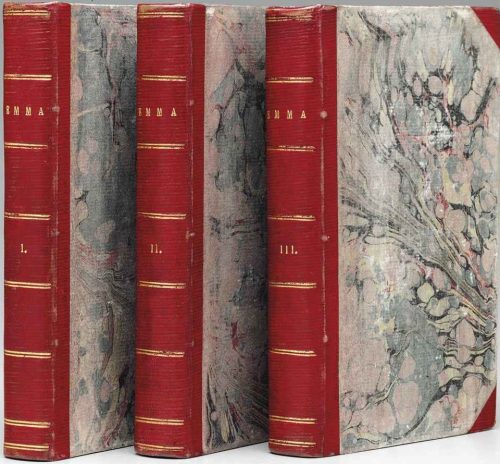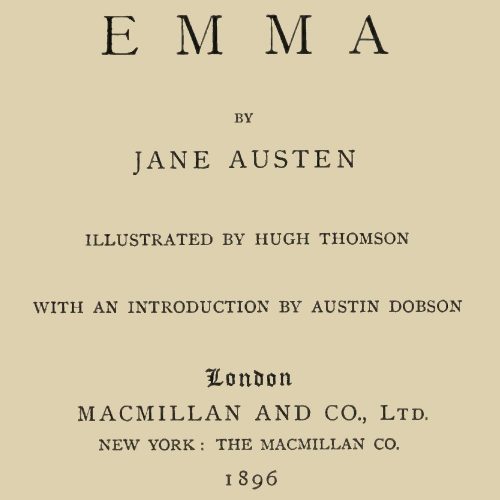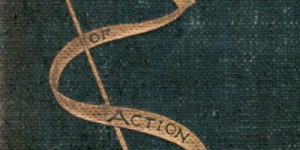Emma Introduction by Austin Dobson
Emma Introduction by Austin Dobson
Emma, a Novel: By the Author of Pride and Prejudice; 3 vols., 12mo, price One Guinea, was first announced in the Quarterly’s list of New Publications for January 1816–the year which appears upon its title-page. In common with Miss Austen’s previous efforts, it was anonymous; but whereas Sense and Sensibility, Pride and Prejudice, and Mansfield Park had been obscurely put forth by the obscure Mr. Egerton of the ‘Military Library,’ Whitehall, Emma was ushered into the world under the auspices of the great Mr. Murray. How this transfer of publishers came about is not stated; but from the fact that the announcement of Emma is immediately followed by that of the second edition of Mansfield Park, it must be assumed that the author’s fortunes were now wholly entrusted to the Albemarle Street house. Notwithstanding the date upon its title-page, it is clear that (as is often the case) Emma was actually in circulation in the December of the previous year, and at a still earlier date either the proofs or the MS. must have been in the hands of the Quarterly’s reviewers, since the book is noticed at considerable length in the number for October 1815. Upon the growth and progress of the story the published correspondence of the author, as usual, throws no light. It should have been begun, however, shortly after Mansfield Park was finished; and, in November 1815,–while Miss Austen was nursing her sick brother Henry at 23 Hans Place, it was apparently passing through the press with all the tardiness traditionally attached to that operation. Proof of this may be said to be supplied by deprecatory explanations from Mr. Murray, and apologies from Mr. Roworth, the Quarterly printer. But before the leisurely letter which tells Cassandra Austen of these things was ended, the book was proceeding–again after the customary fashion of books at press–by leaps and bounds; and in the next bulletin the author is wrestling with the printer’s reader over the inevitable (and generally invaluable) marginal queries in proof. Before the middle of December, Emma was on the point of issue; and before the year had closed it was in the hands of some of writer’s friends, including, of necessity, that distinguished Patron of Art and Letters, the Prince Regent, to who as already related in the Introduction to Pride and Prejudice, [1] it had been inscribed by invitation. In writing to the Prince’s librarian, Mr. J. S. Clarke, on the subject of the presentation copy, which was to reach His Royal Highness three days before any one else, Miss Austen (much in the same way as she had done to her sister with regard to Pride and Prejudice) sets forth her own ideas of the new book–the last, as a matter of fact, which she was destined to behold in type. ‘My greatest anxiety at present is that this fourth work should not disgrace what was good in the others. But on this point (she says) I will myself the justice to declare that, whatever may be my wishes for its success, I am strongly haunted with the idea that to those readers who have preferred Pride and Prejudice it will appear inferior in wit, and to those who have preferred Mansfield Park inferior in good sense.’
Upon any disparities between Emma and its immediate predecessor, Miss Austen must have derived but scant enlightenment from the notice in the Quarterly, which, by some mischance, while professing to summarise her former novels, is absolutely silent as to Mansfield Park. Of the Story of Emma it gives a sufficient report, and an extract of considerable length in illustration of Mr. Woodhouse’s peculiarities. The merits of the author are declared to consist in the neatness and point of the narrative, and the quiet comedy of the dialogue, ‘in which the characters of the speakers evolve themselves with dramatic effect’; while the faults are said to lie in the minute detail of the plan, and in a certain tedium in the presentment of such ‘characters of folly kind simplicity ‘ as Mr. Woodhouse and Miss Bates. This latter deliverance, as may well be imagined, gave but qualified satisfaction to Miss Austen’s first biographer, Mr. Austen-Leigh, nor was it to the taste of her next critic, Dr. Whately, who, five years later, in the same periodical, traversed both these propositions, besides devoting several pages to special examination of the neglected beauties of Mansfield Park. Miss Austen’s minuteness, Dr. Whately argues, even if it can be characterised as tedious, is essential to that complete acquaintance with her characters which is necessary to interest the reader in them; and in regard to the strictures which his forerunner makes upon her fools, he roundly maintains that it requires more genius to paint a fool than a person of sense,–‘that to the eye of a skillful naturalist, the insects on a leaf present as wide differences as exist between he elephant and the lion,’–and that the critics who find Miss Austen’s fools too like nature, must (whatever deference hey may outwardly pay to received opinions) also find Twelfth Night and the Merry Wives of Windsor exceedingly tiresome. In this, and in other parts of his paper, which unhappily was not published until after Miss Austen’s death, Dr. Whately struck the note of subsequent criticism by which, with more or less emphasis, these opinions have been reasserted–the comparison with Shakespeare not omitted. ‘The hand which drew Miss Bates, though it could not have drawn Lady Macbeth, could have drawn Dame Quickly or the nurse in Romeo ard Juliet.’ So says Mr. Austen-Leigh’s latest successor, Prof. Goldwin Smith. Yet a genuine admirer may perhaps allow that some of the excellent Miss Bates’s speeches, even though they should be taken by the reader in double-quick time, would no be the worse for curtailment. ‘La nature est bonne à imiter, mais non pas jusqu’à l’ennui.’ This, however, is the solitary concession we are disposed to make to the first critic of Emma, whose depressing remarks upon its humorous personages had probably their baneful effect upon the humoro personages of Persuasion.
The prolonged interval which lies between the composition of Mansfield Park and Emma and the composition of Miss Austen’s previously published novels has doubtless prompted the discovery of a difference between the style of the earlier and later work–a difference which is perhaps more expected than apparent. For, if a comparison of style must be made, it should surely be between the books last written and Northanger Abbey, rather than between those books and Pride and Prejudice or Sense and Sensibility, since both of these latter were revised by the author at Chawton, while Northanger Abbey was printed precisely as it had been left when the Bath bookseller buried it provisionally in his drawer. But without refining too nicely, it may be granted that the Chawton group of books exhibit just that progress towards perfection which should be expected when we contrast the efforts of a clever girl in her teens with the same person’s productions after she has gained experience of life. We have seen that Miss Austen herself was prepared to be told that Emma was less witty than Pride and Prejudice, and it is manifest that there is a prodigality of sparkle in the one which is–at least–subdued in the other. In Emma, indeed, Miss Austen appears to have adopted Mademoiselle de Lespinasse’s motto of Rien en relief. With the exception of the somewhat laboured outburst in Chapter III in favour of the oldfashioned boarding-school as against the new, the style is everywhere carefully subordinated to the needs of the narrative, while the slender thread of the intrigue is followed with the closest tenacity. The heroine, at first, is scarcely as winning as some of her predecessors, certainly she is not so clever. ‘I am going to take a heroine whom no one but myself will much like,’ said Emma’s creator at the outset, and in part she was right; for Emma’s devices to alienate Harriet from Robert Martin do, at first, create a positive prejudice against her. But her character is so subtly and gradually developed, that by the time she has come to see the errors of match-making, and has reached the luminous moment when ‘it darted through her with the speed of an arrow, that Mr. Knightley must marry no one but herself,’ we are almost prepared to forgive her for being rude to Miss Bates. Whether Mr. Knightley really made an ideal husband is impossible to say, since Miss Austen, although she seems to have vouchsafed some supplementary particulars to her family respecting Frank Churchill and Jane Fairfax, has, on this topic, preserved a discreet silence. Lord Brabourne, who is only lukewarm about Emma as a novel, is distinctly of opinion that the marriage did not prove a success. But he is unreasonably prejudiced against Mr. Knightley, who, he says, ‘interfered too much.’ Perhaps he does, but he loves Emma through all her faults, and all his fault-finding. Again, Lord Brabourne considers Mr. Knightley too old. But here has Shakespeare against him:–
“Let still the woman take
An elder than herself. So wears she to him,
So sways she level in her husband’s heart.”
Emma, let us hope, wore well, for she can only have been forty when her husband was fifty-six. Those, however, who regard Mr. Knightley as the Grandison of Miss Austen’s little gallery will do well to bear in mind her own warning words: ‘They (Mr. Knightley and Edmund Bertram of Mansfield Park) are very far from being what I know English gentlemen often are.’
Of the remaining characters, Frank Churchill is of the race of the Willoughbys and Wickhams, though perhaps more genuinely agreeable; while of Jane Fairfax and blue-eyed Harriet Smith, with the vacuous ‘heart to let,’ there is not much to say. The valetudinarian vagaries of Mr. Woodhouse, with his cultus of thin gruel (which once moved a noble Earl to poetry in a contemporary Keepsake), his horror of the deadly effects of wedding-cake, and his rigid views on the reckless circulation of the muffin, are certain comic, if they do not even rise to tragedy at the point where poor Mrs. Bates is summarily deprived of her sweet bread because the attendant asparagus is decided to be imperfectly cooked. But according to our strenuous modern ideas, Miss Austen would have succeeded in attaching us more closely to Emma’s father if she could have given him some stronger rectifying qualities than amiability and politeness, and it is impossible not to be haunted by the feeling that he receives from those about him rather more consideration and devotion than he rightly deserves. Of Miss Bates and her inimitable (if inordinate) babble enough has been said. But the Eltons are little masterpieces. The husband with his watery acquiescences and stereotyped ‘Exactly so’s,’ and the flashy, rattle-paled wife with her Maplegrove-and-barouche-landau background, are character-sketches of absolute fidelity to nature. Utterly commonplace they may be, but they are also undeniably alive.
Turning the pages of Emma as we close, we are reminded once again of the writer’s limitations, or, to speak with stricter accuracy, of the limitations within which she prefers to exercise her powers. Her characters, as before, are taken from the middle classes; they live in a country village, to which the story is confined; and they are exhibited in enterprises of no greater pith and moment than are involved in the arrangements for a subscription ball at the Crown, or the preliminaries to a picnic at Box Hill. They are unperplexed by problems, social or political: if they are interested in riddles,–transcribed upon hot-pressed paper ‘and ornamented with ciphers and trophies,’–the riddle of, the painful earth has plainly no place in that elegant anthology. There is a clergyman of whose theology we know no more than that lists were made of his texts, not because the discourses thereon were good, but because he himself was good-looking; there are a barrister and a magistrate, to whose practice of their respective vocations about three lines are devoted in three volumes. Books must sometimes have been read even at Highbury; but the evidences of belles lettres are confined to three or four hackneyed quotations (two of which belong to Mrs. Elton) and the casual mention of certain unnamed authors who lie (like Baker’s Chronicle at Sir Roger de Coverley’s) in the window seat at Abbey-Mill Farm. There are references to parochial meetings at the village inn, which must have brought out the relative positions of Mr. Knigntley, Mr. Weston, and Mr. Elton, in a way that would have tempted the pen of Anthony Trollope. But all these things Miss Austen passes by. Doubtless, if she could have been interrogated upon the subject she would have replied–much as she did to the equally impertinent suggestions of the egregious Mr. Clarke–that they were, if not necessarily beyond her hand, at all events beside her matter; and that in any case they were by no means indispensable to the safe conduct of three or four couples towards that ultimate consummation which the high-flown Mrs. Elton describes as ‘Hymen’s saffron robe.’ And whatever Miss Austen’s answer might have been, she is justified by her results. The candid reader Emma–unless, of course, he chance to be the ‘severe, sour-complexioned man’ whom Izaak Walton disallows as a competent judge of literary merit–must admit that the narrative, criticise it as he may, carries him on, interested and expectant, from the first page to the last.
There is another noticeable, and probably hitherto unnoticed, difference between Miss Austen’s work and the novel of to-day, and that is, her almost entire disregard of the servants’ hall as a source for her humorous character. It is true that the names of Mr. Woodhouse’s James, Mrs. Elton’s Wright, Mr. Knightley’s Larkins and Harry, reach us vaguely froM the lower regions; but the persons themselves are never definitely presented. Yet, as Thackery would certainly have hinted, James the coachman must have had his own private views as to the dangerous nature of the ‘corner into Vicarage Lane’; and George Eliot would scarcely have omitted to report at least one of the consultations between William Larkins and his master on the management of the Donwell Abbey Estate, besides letting us know pretty distinctly the opinion of the said William with respect to that master’s marriage. Nor can we help believing that Miss Bate’s Patty (if she had encountered her historian in Mrs. Gaskell) would also be found to have entertained from the first very sagacious and profound opinions as to Miss Jane Fairfax and the cause of her mysterious indisposition. The absence of such matters is to the full as remarkable as the sparing use, already referred to in a previous preface, of descriptive detail. Yet even in the present volume Miss Austen shows that she could, if she would, rival the best of the topographers. Take, for example, the following vignette of the Village High Street. ‘Emma went to the door for amusement. Much could not be hoped from the traffic of even the busiest part of Highbury;–Mr. Perry walking hastily by; Mr. William Cox letting himself in at the office door; Mr. Cole’s carriage-horses returning from exercise; or a stray letter-boy on an obstinate mule, were the liveliest objects she could presume to expect; and when her eyes fell only on the butcher with his tray, a tidy old woman travelling homewards from shop with her full basket, two curs quarrelling over a dirty bone, and a string of dawdling children round the baker’s little boy-window eyeing the gingerbread, she knew she had no reason to complain, and was as amused enough: quite enough still to stand at the door.’ That, we submit, is not only clearly seen, but touched in with the true economy of line.
Postscript
In Mr. Clement Shorter’s highly interesting Charlotte Brontë her Circle is a hitherto unpublished letter from the author of Jane Eyre, which contains a passage relating to the author of Emma. Although unjust to Miss Austen, it is so characteristic of the writer that, with Mr. Shorter’s permission, it is here reproduced:–
“I have likewise read one of Miss Austen’s works–Emma–read it with interest and with just the degree of admiration which Miss Austen herself would have thought sensible and suitable. Anything like warmth or enthusiasm, anything energetic, poignant, heart-felt, is utterly out of place in commending these works: all such demonstration the authoress would have met with a well-bred sneer, would have calmly scorned as autré and extravagant. She does her business of delineating the surface of the lives of genteel English people curiously well. There is a Chinese fidelity, a miniature delicacy, in the painting. She ruffles her reader by nothing vehement, disturbs him by nothing profound. The passions are perfectly unknown to her; she rejects even a speaking acquaintance with that stormy sisterhood. Even to the feelings she vouchsafes no more than an occasional graceful but distant recognition–too frequent converse with them would ruffle the smooth elegance of her progress. Her business is not half so much with the human heart as with the human eyes, mouth, hands, and feet. What sees keenly, speaks aptly, moves flexibly, it suits her to study; but what throbs fast and full, though hidden, what the blood rushes through, what is the unseen seat of life and the sentient target of death–this Miss Austen ignores. She no more, with her mind’s eye, beholds the heart of her race than each man, with bodily vision, sees the heart in his heaving breast. Jane Austen was a complete and most sensible lady, but a very incomplete and rather insensible (not senseless) woman. If this is heresy, I cannot help it.”
[1]Pride and Prejudice (Macmillan’s Illustrated Standard Novels), 1895, xvii
Dobson, Austin. Emma. Macmillan and Co., 1915.











